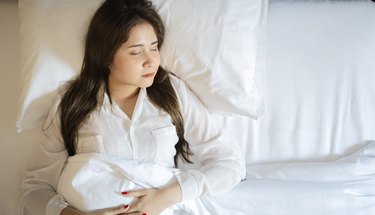
Melatonin and serotonin sound similar, and they're both rather buzzy words in today's world of wellness, especially around the topics of better sleep and improved mood.
And yet, there are major differences between the two, including how melatonin and serotonin actually work in the body.
Video of the Day
Video of the Day
Read on for a better understanding of these two substances, how your body uses them and how they interact with one another.
What Is Melatonin?
Melatonin is a hormone best known for the role it plays in our ability to sleep, though it affects multiple systems in the body, says Michael J. Breus, PhD, a clinical psychologist and sleep medicine doctor.
"Melatonin is produced in two places in the body — the brain's pineal gland and in the gut — and its primary function is to keep your circadian rhythm in sync and to help reduce oxidative stress," he explains.
Melatonin that's made and released in the brain works in concert with the time of day (when it's dark outside, it increases, but when it's lighter, melatonin decreases).
If you travel on long plane rides or experience trouble sleeping, you might know that melatonin can be taken as a supplement to help combat jet lag and ease insomnia.
Related Reading
What Is Serotonin?
Serotonin, says Breus, "is a neurotransmitter that's mostly produced in the gut and helps electrical signals go across nerve cells in the brain."
These messages are transmitted all over the body, telling it how to function. It's also known as "the happy chemical" because it regulates mood; too little serotonin may be related to depression and anxiety.
Serotonin can also affect learning and memory, and it helps regulate body temperature, sleep and hunger.
Similar to melatonin, sunlight levels affect serotonin levels, but in the opposite way: More sunlight results in more serotonin.
It's made from the essential amino acid tryptophan, a substance the body can't produce on its own (it has to come from a food source).
The Melatonin-Serotonin Relationship
The confusion regarding melatonin and serotonin and whether one affects the other may stem from the role that each plays in the body's ability to fall asleep. Melatonin research has studied how this hormone can aid in insomnia and various sleep issues like those related to shift work and delayed sleep phase syndrome.
But "serotonin is a pre-cursor for melatonin," Breus says, which in terms of biology means that one chemical substance is transformed into another. "Serotonin increases melatonin production," he continues.
In terms of sleep, the brain requires serotonin to make melatonin, which in turn regulates the body's sleep-wake cycle.
As for whether melatonin can cause serotonin syndrome, there's no relationship here at all, Breus says. This condition develops due to a buildup of serotonin in the body that's often caused by a combination of drugs (for example, when taking a migraine medication with an antidepressant). Certain illegal drugs and dietary supplements can also lead to serotonin syndrome.
If you take a melatonin supplement, though, make sure it's high quality and has been tested to ensure the label is accurate, especially if you take other medications as well. A February 2017 study in the Journal of Clinical Sleep Medicine found that more than a quarter of 31 melatonin supplements tested contained serotonin.
Melatonin vs. Serotonin
In short, melatonin is a hormone and serotonin is a chemical. Both play major roles in bodily functioning and have an effect on sleep. Serotonin is a pre-cursor to melatonin, which means your body uses serotonin to make melatonin.
Melatonin and Serotonin Sources
Both melatonin and serotonin can be consumed as supplements. Melatonin is also found in a number of foods, while serotonin is made in the body using tryptophan from food sources. It's also possible to raise serotonin levels with exercise and exposure to the sun.
If you're considering a supplement or a change in your diet in order to obtain more melatonin or tryptophan, it's important to speak with your doctor first. Once you get the green light, here are some dietary sources of melatonin as well as sources of tryptophan, which helps make serotonin (bear in mind that researchers are still delving into the tryptophan-serotonin connection).
Melatonin-Rich Foods
- Eggs
- Tart cherries
- Fish (salmon, tuna)
- Nuts
- Mushrooms
- Milk
Food Sources of Tryptophan
- Meats (chicken, turkey, pork)
- Salmon
- Eggs
- Tofu
- Milk
- Oats
- Squash and pumpkin seeds
- Mayo Clinic: Melatonin
- Mayo Clinic: Serotonin Syndrome
- National Library of Medicine, National Center for Biotechnology Information: Dietary Sources and Bioactivities of Melatonin
- Harvard Health Publishing: Serotonin - The Natural Mood Booster
- Journal of Clinical Sleep Medicine: "Melatonin Natural Health Products and Supplements: Presence of Serotonin and Significant Variability of Melatonin Content"
- Cleveland Clinic: "Serotonin"
Was this article helpful?
150 Characters Max
0/150
Thank you for sharing!
Thank you for your feedback!
Is this an emergency? If you are experiencing serious medical symptoms, please see the National Library of Medicine’s list of signs you need emergency medical attention or call 911.